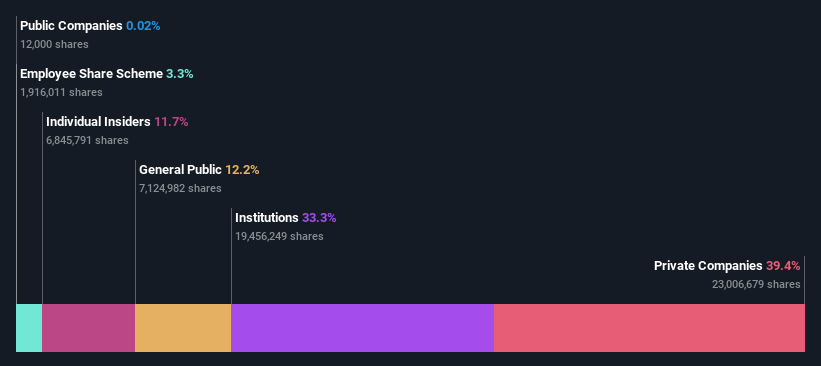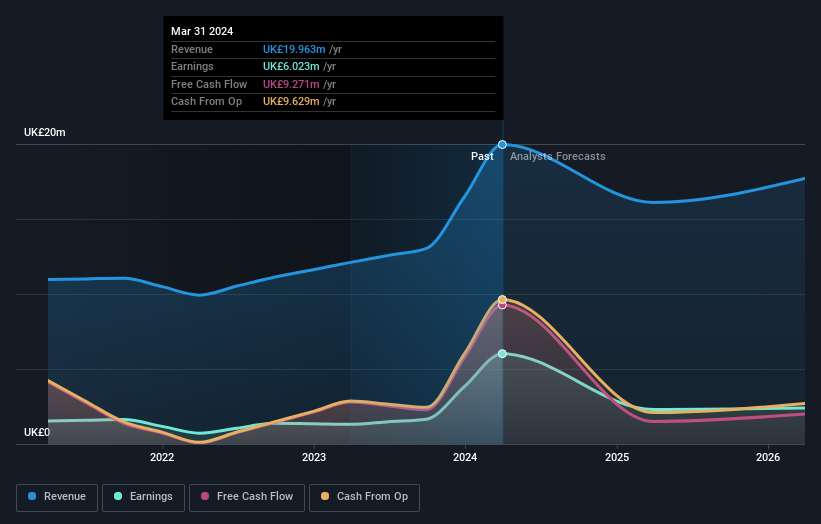- United Kingdom
- /
- Software
- /
- AIM:IGP
Private companies who hold 39% of Intercede Group plc (LON:IGP) gained 15%, institutions profited as well

Key Insights
- The considerable ownership by private companies in Intercede Group indicates that they collectively have a greater say in management and business strategy
- A total of 6 investors have a majority stake in the company with 52% ownership
- 12% of Intercede Group is held by insiders
To get a sense of who is truly in control of Intercede Group plc (LON:IGP), it is important to understand the ownership structure of the business. We can see that private companies own the lion's share in the company with 39% ownership. Put another way, the group faces the maximum upside potential (or downside risk).
Private companies gained the most after market cap touched UK£79m last week, while institutions who own 33% also benefitted.
Let's delve deeper into each type of owner of Intercede Group, beginning with the chart below.
View our latest analysis for Intercede Group

What Does The Institutional Ownership Tell Us About Intercede Group?
Many institutions measure their performance against an index that approximates the local market. So they usually pay more attention to companies that are included in major indices.
We can see that Intercede Group does have institutional investors; and they hold a good portion of the company's stock. This suggests some credibility amongst professional investors. But we can't rely on that fact alone since institutions make bad investments sometimes, just like everyone does. It is not uncommon to see a big share price drop if two large institutional investors try to sell out of a stock at the same time. So it is worth checking the past earnings trajectory of Intercede Group, (below). Of course, keep in mind that there are other factors to consider, too.

We note that hedge funds don't have a meaningful investment in Intercede Group. The company's largest shareholder is Latitude Investments Ltd., with ownership of 26%. The second and third largest shareholders are Canaccord Genuity Asset Management Limited and Anjar International Limited, with an equal amount of shares to their name at 5.5%. Additionally, the company's CEO Klaas van der Leest directly holds 1.8% of the total shares outstanding.
We also observed that the top 6 shareholders account for more than half of the share register, with a few smaller shareholders to balance the interests of the larger ones to a certain extent.
While studying institutional ownership for a company can add value to your research, it is also a good practice to research analyst recommendations to get a deeper understand of a stock's expected performance. There is a little analyst coverage of the stock, but not much. So there is room for it to gain more coverage.
Insider Ownership Of Intercede Group
The definition of company insiders can be subjective and does vary between jurisdictions. Our data reflects individual insiders, capturing board members at the very least. Company management run the business, but the CEO will answer to the board, even if he or she is a member of it.
I generally consider insider ownership to be a good thing. However, on some occasions it makes it more difficult for other shareholders to hold the board accountable for decisions.
Our most recent data indicates that insiders own a reasonable proportion of Intercede Group plc. It has a market capitalization of just UK£79m, and insiders have UK£9.3m worth of shares in their own names. We would say this shows alignment with shareholders, but it is worth noting that the company is still quite small; some insiders may have founded the business. You can click here to see if those insiders have been buying or selling.
General Public Ownership
With a 12% ownership, the general public, mostly comprising of individual investors, have some degree of sway over Intercede Group. While this size of ownership may not be enough to sway a policy decision in their favour, they can still make a collective impact on company policies.
Private Company Ownership
It seems that Private Companies own 39%, of the Intercede Group stock. Private companies may be related parties. Sometimes insiders have an interest in a public company through a holding in a private company, rather than in their own capacity as an individual. While it's hard to draw any broad stroke conclusions, it is worth noting as an area for further research.
Next Steps:
While it is well worth considering the different groups that own a company, there are other factors that are even more important. For example, we've discovered 1 warning sign for Intercede Group that you should be aware of before investing here.
If you would prefer discover what analysts are predicting in terms of future growth, do not miss this free report on analyst forecasts.
NB: Figures in this article are calculated using data from the last twelve months, which refer to the 12-month period ending on the last date of the month the financial statement is dated. This may not be consistent with full year annual report figures.
New: AI Stock Screener & Alerts
Our new AI Stock Screener scans the market every day to uncover opportunities.
• Dividend Powerhouses (3%+ Yield)
• Undervalued Small Caps with Insider Buying
• High growth Tech and AI Companies
Or build your own from over 50 metrics.
Have feedback on this article? Concerned about the content? Get in touch with us directly. Alternatively, email editorial-team (at) simplywallst.com.
This article by Simply Wall St is general in nature. We provide commentary based on historical data and analyst forecasts only using an unbiased methodology and our articles are not intended to be financial advice. It does not constitute a recommendation to buy or sell any stock, and does not take account of your objectives, or your financial situation. We aim to bring you long-term focused analysis driven by fundamental data. Note that our analysis may not factor in the latest price-sensitive company announcements or qualitative material. Simply Wall St has no position in any stocks mentioned.
Have feedback on this article? Concerned about the content? Get in touch with us directly. Alternatively, email editorial-team@simplywallst.com
About AIM:IGP
Intercede Group
A cybersecurity company, develops and supplies identity and credential management software for digital trust in the United Kingdom, rest of Europe, the United States, and internationally.
Flawless balance sheet and fair value.
Market Insights
Community Narratives




